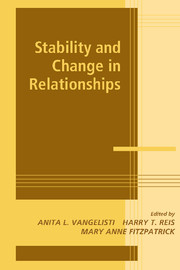PART ONE - ACTORS: THE SCAFFOLDING OF STABILITY AND CHANGE
Published online by Cambridge University Press: 21 October 2009
Summary
A scaffold is a temporary structure built to support workers as they erect a new structure, or repair, reinforce, or demolish an existing one. Individuals and their distinctive personalities, emotions, and cognitions provide the scaffolding for change and stability in relationships. There is a continually evolving dynamic association between the factors that characterize individuals and those that define their relationships. The mental models, emotional history, and personality that individuals bring to their relationships create a context that promotes certain relational outcomes while discouraging others; these outcomes, in turn, affect the actors' personal qualities in numerous respects. Although the term “personality” is difficult to define, several contemporary approaches emphasize the characteristics that facilitate individuals' adaptation to the environment. Adapting to the social environment is, of course, one of life's most important and challenging tasks. Thus, studies of those dimensions of personality – and their manifestations in thoughts, feelings, and behavior – that regulate interpersonal relationships are likely to provide important insights into the processes of stability and change. The growing evidence that many genetically determined individual differences are designed to address common adaptive situations faced during human evolution (which, of course, prominently included interpersonal situations), and that other genetic differences interact with features of the environment in shaping the individual, testifies to the centrality of relationship-relevant personality factors in studying the processes of stability and change.
People's understanding of relationships is best considered as a work in progress, amenable to revision by experience, especially experience in current relationships.
- Type
- Chapter
- Information
- Stability and Change in Relationships , pp. 1 - 4Publisher: Cambridge University PressPrint publication year: 2002



